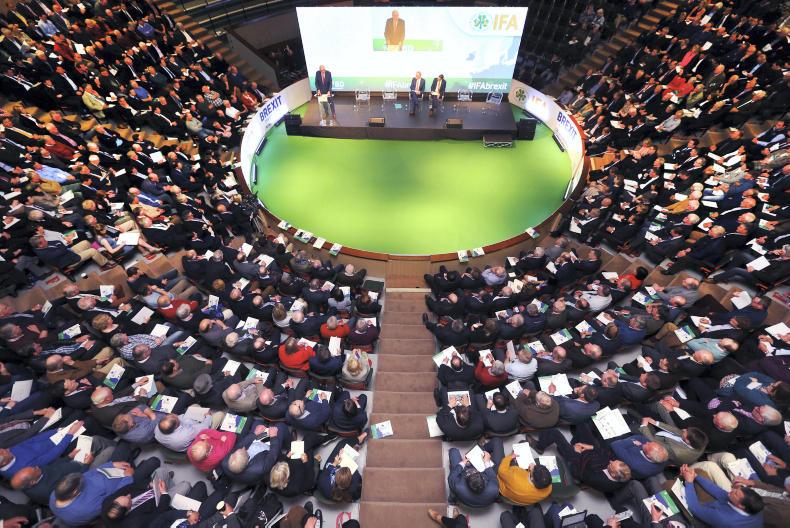UK proposals for a workable post-Brexit border regime have been dismissed as “a fantasy”.
Irish agriculture, which is the most exposed sector in the entire EU economy to Brexit border controls, remains extremely concerned following the British government’s outline of its vision of how they will operate.
The UK essentially proposed either a real EU/UK customs border, but one driven by a technology-led inspection system, or alternatively a “customs partnership”– where the UK would leave the customs union, but essentially retain all the advantages of a common custom area with the EU.
Cake
The latter proposal was widely interpreted as the UK wanting to have its cake and eat it, with the European parliament’s Brexit negotiator Guy Verhofstadt branding it “a fantasy”.
The former proposal seems incompatible with a separate position paper on the specific issue of the Republic of Ireland/Northern Ireland border.
It suggests a wide-ranging exemption under which small and medium-sized enterprises will not have to comply with any new customs tariffs and a common travel area between Ireland and the UK would be maintained. It also proposes an almost “invisible border”.
“While the principle of avoiding any physical border infrastructure between the Republic of Ireland and Northern Ireland is positive, it is very difficult to see how this could operate in practice,” said IFA president Joe Healy.
Border checks
“If the UK insists on pursuing its own free trade agreements, two divergent regimes would have to operate on the island and it is impossible to see how border checks could be avoided.”
ICMSA president John Comer said “a post-Brexit arrangement that maintains tariff-free trade between Ireland and the UK is Ireland’s ‘Holy Grail’”, but doubted that the proposals would be well received.
“At the moment, it seems the uncertainty around Brexit is deepening rather than dissipating, which is clearly playing out in the continued weakening of sterling” concluded Cormac Healy of Meat Industry Ireland.
Meanwhile, the euro continued strengthening this week against sterling reaching 91.2p, up from 85.2p at the start of the year.
Morgan Stanley has predicted parity between the euro and sterling by March next year.
This has caused particular problems for the mushroom industry, which exports 90% of its production to the UK.
IFA mushroom chair Gerry Reilly has called for direct Government support for the sector through low cost loans in the budget, continued support for the Producer Organisation Scheme and use of CAP Market support measures to deal with what has been a market disturbance caused by the Brexit vote.
Read more
UK plan for Brexit a ‘positive’ - EU Commission
UK position means a hard Brexit – IFA
Editorial: EU needs to present a plan B for Brexit
Colm McCarthy: flimsy customs union proposals
UK proposals for a workable post-Brexit border regime have been dismissed as “a fantasy”.
Irish agriculture, which is the most exposed sector in the entire EU economy to Brexit border controls, remains extremely concerned following the British government’s outline of its vision of how they will operate.
The UK essentially proposed either a real EU/UK customs border, but one driven by a technology-led inspection system, or alternatively a “customs partnership”– where the UK would leave the customs union, but essentially retain all the advantages of a common custom area with the EU.
Cake
The latter proposal was widely interpreted as the UK wanting to have its cake and eat it, with the European parliament’s Brexit negotiator Guy Verhofstadt branding it “a fantasy”.
The former proposal seems incompatible with a separate position paper on the specific issue of the Republic of Ireland/Northern Ireland border.
It suggests a wide-ranging exemption under which small and medium-sized enterprises will not have to comply with any new customs tariffs and a common travel area between Ireland and the UK would be maintained. It also proposes an almost “invisible border”.
“While the principle of avoiding any physical border infrastructure between the Republic of Ireland and Northern Ireland is positive, it is very difficult to see how this could operate in practice,” said IFA president Joe Healy.
Border checks
“If the UK insists on pursuing its own free trade agreements, two divergent regimes would have to operate on the island and it is impossible to see how border checks could be avoided.”
ICMSA president John Comer said “a post-Brexit arrangement that maintains tariff-free trade between Ireland and the UK is Ireland’s ‘Holy Grail’”, but doubted that the proposals would be well received.
“At the moment, it seems the uncertainty around Brexit is deepening rather than dissipating, which is clearly playing out in the continued weakening of sterling” concluded Cormac Healy of Meat Industry Ireland.
Meanwhile, the euro continued strengthening this week against sterling reaching 91.2p, up from 85.2p at the start of the year.
Morgan Stanley has predicted parity between the euro and sterling by March next year.
This has caused particular problems for the mushroom industry, which exports 90% of its production to the UK.
IFA mushroom chair Gerry Reilly has called for direct Government support for the sector through low cost loans in the budget, continued support for the Producer Organisation Scheme and use of CAP Market support measures to deal with what has been a market disturbance caused by the Brexit vote.
Read more
UK plan for Brexit a ‘positive’ - EU Commission
UK position means a hard Brexit – IFA
Editorial: EU needs to present a plan B for Brexit
Colm McCarthy: flimsy customs union proposals






 This is a subscriber-only article
This is a subscriber-only article










SHARING OPTIONS: